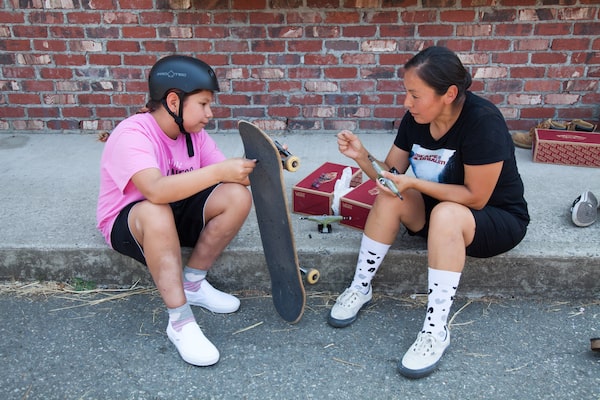
Faith Turner, 16, learns how to put trucks on a skateboard with skate teacher and founder of Nations Skate Youth, Rose Archie, 39, on Aug. 3, 2021.Jill Schweber/The Globe and Mail
When Rose Archie of Nations Skate Youth set foot in Gallup, N.M., she was immediately captivated by the Indigenous history and culture she saw everywhere – on the city’s murals, in galleries and in shops.
Gallup is located on the edge of the Navajo Nation, near both the Pueblo of Zuni and the Hopi Reservation. Vancouver-based Ms. Archie and her co-workers were there in April to teach Indigenous young people skateboarding techniques, but also to share a message she’s delivered to First Nations youngsters across the continent: “Be proud of who you are and where you come from.”
The clinic in Gallup was one of about 30 workshops held by the organization over the past two years, and the first in the United States. The group formed after Ms. Archie travelled in 2020 to Fort St. John, B.C., where she skated and talked about mental health with young people.
The group, which includes Indigenous skateboarders Joe Buffalo, Dustin Henry, Tristan Henry and Adam George, strives to use physical activity to empower and inspire. The group has brought the sport to Indigenous communities in B.C., Alberta and Yukon. Often the workshops involve songs drummed by First Nations members and a circle talk led by Ms. Archie.
She said she tells workshop participants: “Don’t let the statistics make you feel ashamed to be Indigenous. … You’re the future leaders, and you’re the ones that are going to carry on the culture, the traditions, the languages.”
Across the Indigenous communities the group has visited, Ms. Archie has seen commonalities in how eager the youth are to connect – and also in the struggles some of the people face, such as alcohol and drug abuse, and higher suicide rates.
“We try not to judge a book by its cover, we give our time to the youth and we just want to put smiles on their faces and we want to remind them that they’re loved and they matter.”
An urban First Nation reclaims stewardship over vast rainforest on Metro Vancouver’s doorstep
During the workshop in Gallup, one skater told her about the death of a community member by suicide, and what hardships some young people are going through.
Ms. Archie, from Tsq’escemc – Canim Lake, B.C., could relate. Alcoholism within her home community led to several suicides, she said.
“So skateboarding has definitely saved my life in that way – being able to do something that takes your mind off of all that negative sadness that’s going on around you.”
Similarly, Mr. Buffalo, from Maskwacis, Alta., described skateboarding as a “saviour” in his life. A member of the Samson Cree Nation, he was taken off reserve at age 11 and forced into one of Canada’s last remaining residential schools. Skateboarding offered Mr. Buffalo a path to heal from his childhood trauma.
“For a long time, I was very distant from my culture and from my community. I was so deep in addiction that I just was too ashamed to lean on someone,” he said.
Gallup, where a substantial percentage of the population is Native American, built its first skate park in 2018. The activity has been slowly taking off in the city and is having a significant impact on Indigenous young people, according to a local skate shop owner who helped facilitate the workshop.
“We’re in the middle of some different tribes. And these tribes are pretty secluded,” said Cecely Todacheenie, owner of the Enchantment Skate Shop.
The sport “really gives them an outlet to stay active and turn to something positive.”
Many cities across North America are recognizing the sport as an important outlet for young people. Last month, Vancouver approved a strategy to invest up to $19.6-million to improve the city’s skateboarding infrastructure over the next two decades. The investment will help build seven new skate parks and upgrade existing facilities.
The Vancouver Board of Parks and Recreation noted in a report that the surging popularity of the activity is overwhelming existing skate amenities, presenting barriers for people looking to participate. This is particularly true for young people, women and members of Indigenous and marginalized communities, it added.
In the past, Ms. Archie, who sits on an advisory group for the city’s strategy, has used Nations Skate Youth to bring ramps to communities that don’t have a skate park.
“I’m hoping that we can get more skate parks in communities so kids don’t have to hitchhike or leave their community to go do something fun after school.”
Besides skating, Ms. Archie’s group is creating a book dedicated to the next generation of youth across the continent and beyond to be published this year. The main objective is to showcase Indigenous skateboarding, art and music.
The organization has given out cameras to the young people so that they can take photos of what inspires them, and photos that share Indigenous culture and traditions. All their work will be included in the book, Ms. Archie said.
“I always thought it would be so cool to have a book that had only indigenous people, something the next generation can open and see Indigenous skateboarders, companies, artists, musicians and highlight our culture and share what inspires us,” she said.
We have a weekly Western Canada newsletter written by our B.C. and Alberta bureau chiefs, providing a comprehensive package of the news you need to know about the region and its place in the issues facing Canada. Sign up today.
 Xiao Xu
Xiao Xu